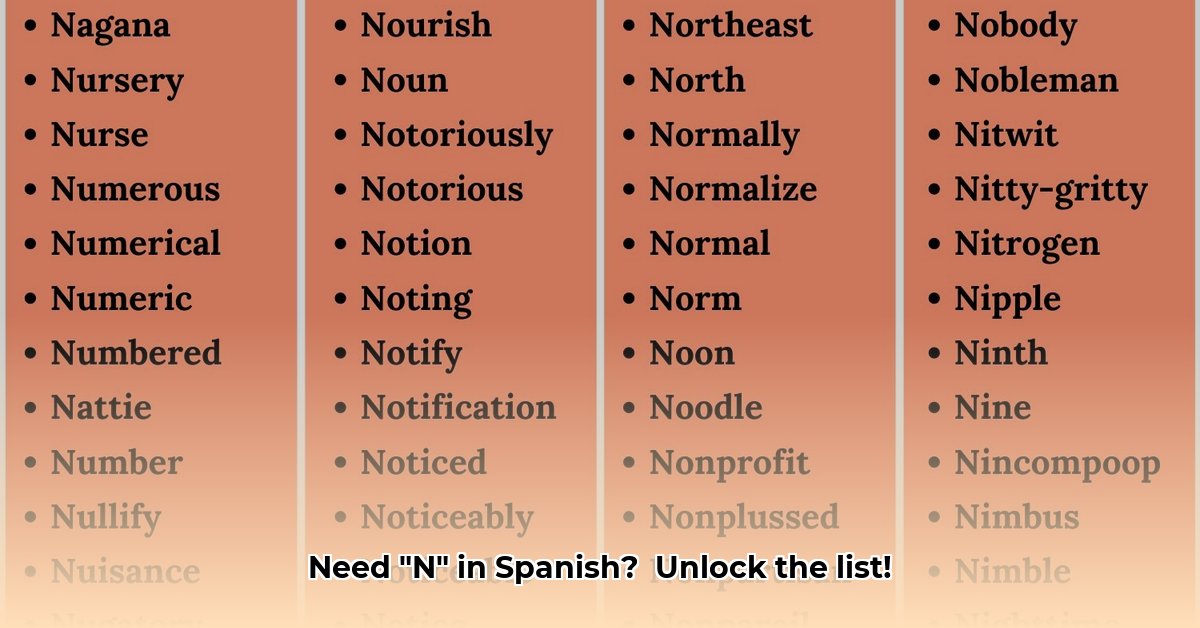This guide explores Spanish words starting with “N,” from everyday vocabulary to more nuanced terms, offering pronunciation tips and cultural insights.
Navigating the “N” Words
Let’s explore the diverse world of Spanish words beginning with “N.” We’ll cover nouns, verbs, adjectives, and adverbs, providing clear definitions and examples to help you expand your vocabulary.
Nouns: Naming the World Around Us
Nouns form the foundation of language. Here’s a categorized list of Spanish nouns starting with “N,” accompanied by their gender, English translation, and example sentences.
Table of Common “N” Nouns
| Noun | Gender | Translation | Example Sentence |
|---|---|---|---|
| Nación | f. | Nation | La nación es grande. (The nation is big.) |
| Nacionalidad | f. | Nationality | Su nacionalidad es española. (Their nationality is Spanish.) |
| Naranja | f. | Orange | La naranja es dulce. (The orange is sweet.) |
| Nariz | f. | Nose | Mi nariz está congestionada. (My nose is congested.) |
| Naturaleza | f. | Nature | La naturaleza es hermosa. (Nature is beautiful.) |
| Navidad | f. | Christmas | La Navidad es en diciembre. (Christmas is in December.) |
| Necesidad | f. | Necessity | La necesidad es la madre de la invención. (Necessity is the mother of invention.) |
| Negocio | m. | Business | El negocio va bien. (The business is going well.) |
| Nervio | m. | Nerve | El nervio está dañado. (The nerve is damaged.) |
| Niebla | f. | Fog | La niebla es espesa. (The fog is thick.) |
| Nieve | f. | Snow | La nieve es blanca. (The snow is white.) |
| Niño | m. | Boy/Child | El niño juega. (The boy plays.) |
| Niña | f. | Girl/Child | La niña canta. (The girl sings.) |
| Noche | f. | Night | La noche es oscura. (The night is dark.) |
| Nombre | m. | Name | Mi nombre es… (My name is…) |
| Norte | m. | North | El norte es frío. (The north is cold.) |
| Noticia | f. | News (piece of) | La noticia es buena. (The news is good.) |
| Noviembre | m. | November | Noviembre es un mes de otoño. (November is an autumn month.) |
| Nube | f. | Cloud | La nube es blanca. (The cloud is white.) |
| Número | m. | Number | El número uno. (The number one.) |
Gender Clues and Exceptions:
While words ending in “-o” are often masculine and those in “-a” feminine, exceptions exist. This makes learning genders a fascinating aspect of exploring Spanish.
Etymology and Cultural Context:
The history and cultural context of words can often shed light on their gender. Research into this area is ongoing, and new theories may emerge. Exploring idioms and expressions containing “N” nouns can further enrich your understanding of the language and culture.
Verbs: Bringing Language to Life
Verbs add action and dynamism. Here’s a look at some key Spanish verbs starting with “N”:
Common “N” Verbs
- Nacer (to be born): ¿Dónde naciste? (Where were you born?)
- Necesitar (to need): Necesito un café. (I need a coffee.)
- Negar (to deny): Niego la acusación. (I deny the accusation.)
- Navegar (to navigate/sail): Navegamos por el Mediterráneo. (We sailed the Mediterranean.)
Less Common “N” Verbs
- Nombrar (to name/appoint): Nombraron a un nuevo director. (They appointed a new director.)
- Narrar (to narrate/tell a story): Me gusta narrar cuentos. (I like telling stories.)
Conjugating Nacer (Present Tense)
| Verb | Yo (I) | Tú (You) | Él/Ella/Usted (He/She/You formal) | Nosotros (We) | Vosotros (You all – Spain) | Ellos/Ellas/Ustedes (They/You all formal) |
|---|---|---|---|---|---|---|
| Nacer | nazco | naces | nace | nacemos | nacéis | nacen |
Pronunciation and Regional Variations:
The “n” sound is generally straightforward. However, in “nacer,” the “c” is pronounced like “th” in “thin” in Spain (/naˈθeɾ/) and like “s” in Latin America (/naˈseɾ/). Regional variations add to the richness of the Spanish language.
Adjectives and Adverbs: Adding Description and Nuance
Adjectives modify nouns, while adverbs modify verbs, adjectives, or other adverbs.
Table of “N” Adjectives
| Adjective | Translation | Example |
|---|---|---|
| Nacional | National | El equipo nacional (The national team) |
| Natural | Natural | Un producto natural (A natural product) |
| Necesario | Necessary | Es necesario estudiar. (It is necessary to study.) |
| Negro | Black | Un gato negro (A black cat) |
| Nervioso | Nervous | Me siento nervioso. (I feel nervous.) |
| Nuevo | New | Un libro nuevo (A new book) |
| Numeroso | Numerous | Había numerosas personas. (There were numerous people.) |
Examples of “N” Adverbs
- Normalmente (normally): Normalmente como a las dos. (I normally eat at two.)
- Nuevamente (newly; again): Intentémoslo nuevamente. (Let’s try it again.)
This guide provides a strong foundation for exploring Spanish words starting with “N.” Remember, language learning is an ongoing journey. Continue exploring resources like SpanishDict and Collins Spanish Dictionary to deepen your understanding. Don’t be afraid to experiment, ask questions, and embrace the nuances of this beautiful language.
- Portable Hydroelectric Generators Harness Nature for Off-Grid Power - February 21, 2026
- Generate Free Electricity for Home From Renewable Sources - February 18, 2026
- Micro-Hydro Offers Cheapest Home Electricity if You Have a Stream - February 17, 2026
















